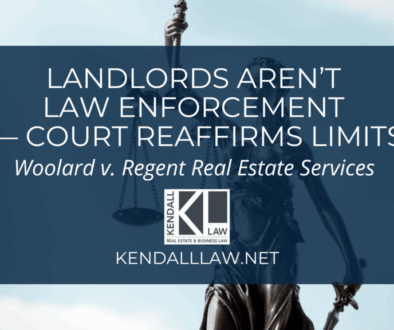Vacant Property and Squatter’s Rights
In my last post, we talked about the slippery slope of short-term rentals and how important timeframes and clear rental agreements are to avoid facing the legal challenges under the squatter’s rights. (Read the post here)
Many of the same legal issues apply when it comes to vacant properties or if an owner is not paying attention to any unintended occupancy of their properties, they could lose ownership to the squatters depending on the situation.
How does one obtain “squatter’s rights” or even ownership in a property by moving in without consent of the owner?
- To obtain squatter’s rights, the squatter just needs to establish that they have been living there for over 30 days.
- To obtain ownership, someone simply needs to prove that they have been living in the property, paying taxes, without the consent of the owner for over 5 years.
Case in Point: Owner loses townhouse she inherited due to squatters
In July 2017, there was an article in the LA Times about an owner losing ownership of the townhouse she inherited from her father due to squatters. She was not local and did not want to deal with tenants, so she left the property vacant for 13 years. During that time, she never visited the property and did not question the HOA as to why she was not getting HOA bills or inquire as to why she was not getting any tax bills.
For some reason, after 13 years she decided to go to the property. To her dismay, when she got there, she found that the property was occupied. When she spoke to the HOA, the HOA told her that the “squatters” were paying the HOA bills. Then at some point in time the “squatters” obtained legal title to the property, presumably through an action for adverse possession which allows a person to claim a property right in land owned by another.
What the heck? How did they do that without notice of the lawsuit to the owner?
Well, they probably could not locate any information on the current owner – her father was deceased and title may have never transferred to her. All the squatters would need to do is show that they had made “good faith” attempts to find the owner in order for the Court to allow service by publication in a local paper. Since the owner was not local, she would have never seen it. The squatters would then obtain judgment for title by way of default.
Impersonating an owner? It really does happen!
There was a recent incident of squatters taking up residence in a house in Torrance. In October, the Daily Breeze featured a story where a property owner went to his vacant property only to find that it was not vacant. One of the squatters told the owner that he paid someone he believed was the owner a security deposit and first month’s rent. After receiving the money, the person stopped returning calls and went MIA.
This is more common than you think. At my last firm, I had an eviction after foreclosure where a third party came to court saying she was a renter. She claimed to have paid several months of rent and a security deposit. While it was unfortunate that she had been scammed, I was able to establish that she did not have a lease with the borrower that was foreclosed on and obtained a judgment for possession.
If you are going to have a vacant property, I suggest that you or someone else you trust, visit the property regularly to ensure that someone does not move in without your knowledge or if they do, you find out before the lapse of any time period that would give them rights to the property.
Related Post: Risks of Short-Term Rentals and Squatter’s Rights
Author: Eileen Kendall





